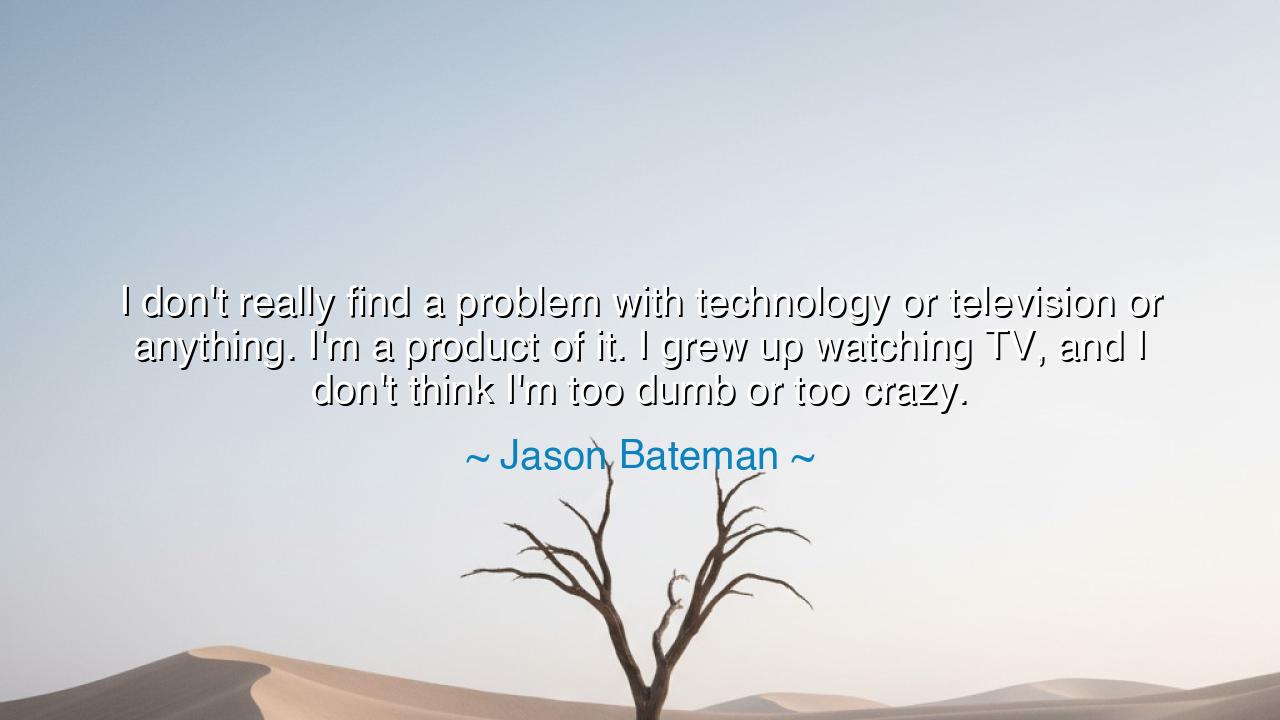
I don't really find a problem with technology or television or
I don't really find a problem with technology or television or anything. I'm a product of it. I grew up watching TV, and I don't think I'm too dumb or too crazy.






Hear, O children of the present age, the voice of Jason Bateman, who declared: “I don’t really find a problem with technology or television or anything. I’m a product of it. I grew up watching TV, and I don’t think I’m too dumb or too crazy.” These words may sound modest, even playful, yet they carry a wisdom hidden within them. For in them lies the truth that the tools of an age do not define the worth of a person—what matters is how one shapes oneself through them. Bateman speaks as one who has lived in the glow of the screen, raised in the age of mass media, and yet has found not ruin, but stability and craft.
The origin of this teaching lies in the suspicion that has always followed new inventions. Every generation fears the tools of the next. When books first spread through the press, elders feared that the young would no longer memorize or think deeply. When radio filled the airwaves, many warned that it would rot the mind with idle chatter. And with the rise of television, critics claimed it would make people lazy, foolish, and detached from reality. Bateman answers these voices not with theory, but with his own life: he grew up in this age of screens, yet he is not diminished by it. He is proof that technology does not, by itself, corrupt the human soul.
Consider, O listeners, the story of Neil Postman, who warned in his book Amusing Ourselves to Death that television might turn all discourse into entertainment. His warning was not without wisdom, for indeed, many have been dulled by screens and endless spectacle. Yet Bateman reminds us of another truth: tools are mirrors of the user. Just as one man may waste his days before the screen, another may learn, laugh, and find inspiration there. The difference lies not in the television, but in the choices of the one who watches.
The ancients, too, teach us this lesson. Fire could warm the hearth or burn the village. The sword could defend the innocent or enslave the weak. Every tool carries two faces, and it is the hand that wields it that decides its legacy. So it is with TV and all modern technology: they are not demons nor angels in themselves, but vessels that amplify the desires of those who hold them. Bateman’s declaration is thus a rejection of fear and a call to responsibility.
Let us see the deeper meaning: to be a product of technology is not to be its slave, but to acknowledge that each of us is shaped by the age in which we live. We cannot escape the currents of our time, but we can decide how to swim in them. Bateman grew with television, but he chose to grow with balance, not surrendering mind or heart to the glow of the screen. In this, his words carry encouragement for all who fear they are too much a product of their age: you can be shaped by it, yet not ruined by it.
The lesson, then, is clear: do not fear the tools of your era, but use them wisely. Do not curse television or technology, but look within yourself and ask: how do I use them? Do they numb me, or do they teach me? Do they enslave me, or do they inspire me? For the screen is not a master, but a servant; not a chain, but a mirror. The strength lies not in the device, but in the soul that wields it.
Practical actions flow from this wisdom. Choose what you consume with discernment. Watch not only for pleasure, but also for growth. Balance the time spent before screens with the time spent in reflection, in conversation, in creation. Use technology to connect, to learn, to imagine, not merely to pass the hours. And above all, trust that you need not be diminished by the tools of your age—so long as you live with intention and care, you can rise above them, even while being a child of them.
Thus do we honor the words of Jason Bateman: that to be a product of television and technology is not to be doomed, but to be given a choice. Carry this teaching, O children of tomorrow, and let your lives show that you are not too dumb, nor too crazy, but wise enough to use the gifts of your time without being consumed by them. For in the end, it is not the screen that defines you—it is the spirit within you.






AAdministratorAdministrator
Welcome, honored guests. Please leave a comment, we will respond soon